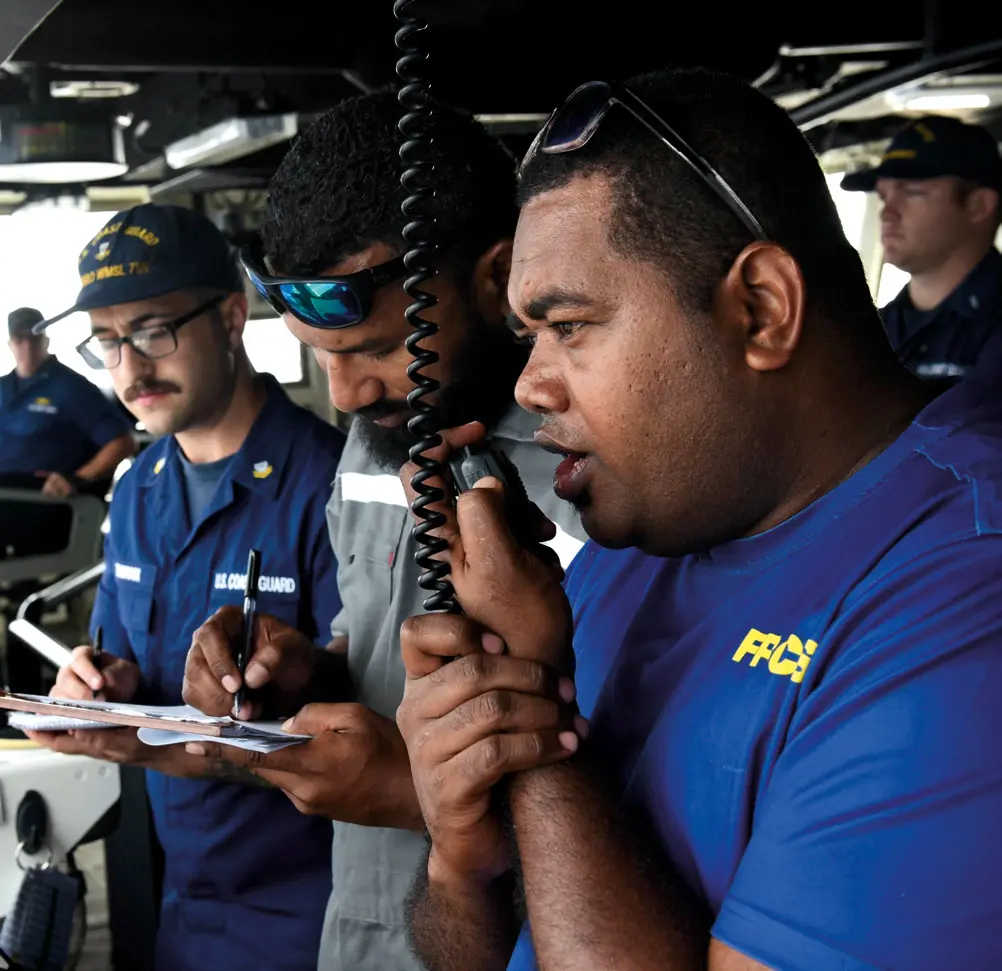Joint Analytical Cell: Data, Intelligence and Tools to Combat Illegal Fishing
Overview
Illegal, unreported and unregulated (IUU) fishing is a global threat whose solutions begin with collaboration across the international community. Costing States billions of dollars in lost revenue each year, IUU fishing pushes overexploited fish stocks toward collapse, causing untold damage to marine ecosystems, and perpetuates associated crimes, including human rights abuses.
New tools and technologies, fueled by satellite tracking and machine learning, are enabling us to monitor fishing activities in ways that would have been impossible just a few years ago. This presents new opportunities to transform the way we govern our ocean and unlock ways to close the net on illegal fishing. But the international cooperation required to achieve such results is lacking, and too many countries do not yet have the information they need or the capacity to act upon it.
The Joint Analytical Cell, or JAC, aims to change that. By opening up access to data, intelligence and tools at scale, this unique collaboration seeks to strengthen fisheries management worldwide and support effective action to end the scourge of IUU fishing.
The problem: untapped potential
With fish stocks and marine ecosystems under ever- increasing pressure from human activity, clamping down on IUU fishing has never been more important. And with the emergence of new technology offerings—many of which are inexpensive or free of cost and based on open, publicly available data—the effective monitoring, control and surveillance (MCS) of fisheries is becoming more possible and more affordable.
Satellites and other remote surveillance techniques allow vessels and their activities to be monitored in near real- time, even far from shore. Databases contain a wealth of information about the global fishing fleet and the companies behind it. Machine learning and data analytics provide insights and intelligence that support investigations and targeted enforcement against those acting illicitly. But information is only good when it is put to use and, right now, the knowledge created by various tools and technology is not being used to its utmost potential, creating lost opportunities for those in charge of managing our ocean. Most authorities rely on expensive proprietary systems for monitoring fishing vessels and managing data. This limits possibilities for sharing information and intelligence internationally, which is crucial for combating IUU fishing. In developing regions, which often face the greatest challenges from IUU fishing, few States have access to the latest data and technology and often lack the capacity to analyze and act upon the information they do have.

Our Solution
The JAC aims to transform ocean governance by facilitating collaboration, information sharing, intelligence-led MCS, and capacity building. We seek to enable access to data, technology and analytics at scale, with a particular focus on supporting developing coastal States that are responsible for overseeing vast areas of the ocean but may not have the capabilities to do so.
Founded in 2022 by the International Monitoring, Control and Surveillance (IMCS) Network, Global Fishing Watch and TMT —and since joined by C4ADS and Skylight—the JAC harnesses innovative technology and the complementary expertise and resources of its members and wider collaborating organizations, including State actors, nongovernmental organizations and technology providers. It serves as a hub for sharing intelligence, making sense of the multiple technology and data offerings, and providing operational support and training to enable collaborative action to combat IUU fishing worldwide.
Members

IMCS Network is an intergovernmental organization that promotes and facilitates cooperation and coordination in the fight against IUU fishing through collaboration, information exchange and capacity development between fisheries law enforcement professionals. An informal, voluntary network, its members include more than 80 national fisheries administrations and regional fisheries organizations.

C4ADS is a nonprofit organization with a mission to defeat the illicit networks that threaten global peace and security. Powered by cutting-edge data science, innovative technology applications, and evidence-driven analysis, it works to coordinate effective global responses to drivers of conflict, instability, environmental crime and human rights abuses around the world.

TMT provides national fisheries authorities and international organizations with intelligence and analysis, to assist enforcement actions and broader improvements in fisheries governance. Its Fisheries Analytical Capacity Tool (FACT) supports analysis of the identities and characteristics of the global fishing fleet and the companies that operate it.

Skylight is a maritime monitoring and analysis software platform providing analysts and protected area managers with a near real-time tool to identify suspicious vessel behavior and take action. Applying state-of-the-art AI, such as computer vision and machine learning to a combination of data sources, Skylight is accelerating the way organizations make data-driven operational decisions critical to maritime security and restoring the health of our ocean.

Global Fishing Watch is an international nonprofit organization dedicated to advancing ocean governance through increased transparency of human activity at sea. Its tools include a freely available open-source global map, powered by satellite technology and machine learning, that enables users to track and analyze fishing vessel activity.
Areas of focus
The JAC identifies, collects, collates and integrates wide arrays of information and datasets and employs data analytics to provide actionable fisheries intelligence. This enables maritime authorities to target MCS and enforcement operations where the risks are highest, including warning port authorities before the arrival of a vessel suspected of illegal activity or alerting air and sea patrols of suspicious transshipment activities.
We provide fisheries enforcement agencies and other partners, particularly in developing countries, with direct support and training to enable them to use all available technology platforms, datasets and MCS mechanisms effectively. Based on a needs assessment conducted directly with the agency or partner, assistance targets specific technology and knowledge gaps and supports improved MCS efficiency and effectiveness. As well as pursuing immediate impact on the water and at an institutional level, we take a ‘train the trainer’ approach to build national capacity and expertise for the long-term.

The JAC promotes collaboration with independent technology providers to apply their tools to fisheries MCS. This includes developing new products and capabilities to deliver useful data, analysis and intelligence, supporting partners to use the tools available, and ensuring they continue to evolve and remain affordable. Agencies and partners are not required to share their data with the JAC to receive direct support from the initiative, although the benefits of data sharing—an important approach for addressing IUU fishing—are both demonstrated and encouraged.
The JAC is built on collaboration. The members draw on the strength of their existing relationships and networks to develop new partnerships with government agencies, nongovernmental organizations, technology providers, regional fisheries management organizations and others who share our goals.
Our Impact
By providing high-quality intelligence and capacity building to those that need it most, the JAC tackles IUU fishing cost-effectively and at scale. It supports enforcement authorities to carry out targeted, risk-based and effective MCS and enforcement operations. As well as closing the net on those who do fish outside the law, the Joint Analytical Cell acts as a deterrent to others as illicit activities become harder to hide. The insights and analysis the JAC provides also support evidence-based policy, regulatory and legal reforms to strengthen ocean governance.
Within the next four years, we aim to assist:
- More flag, coastal, and port States, as well as beneficial owner States, taking enforcement action to address illegal fishing.
- More developing flag, coastal and port States using technology platforms and data analytics for fisheries MCS and enforcement.
- More port inspections, investigative actions and enforcement responses that lead to successful prosecutions.
- Better data availability and transparency in fisheries operations in partner countries.
- New policy actions developed or enhanced with JAC support.

